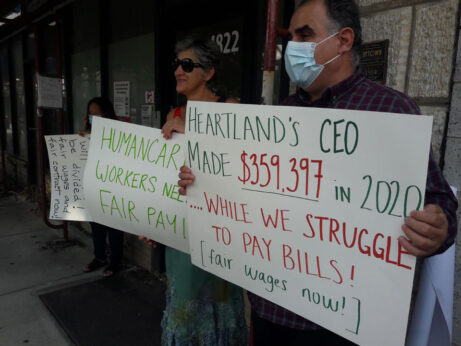
CHICAGO – Over 500 workers are locked in a battle with Heartland Alliance, one of the nation’s oldest, largest, and most venerable social justice non-profits, over wages and health and safety conditions. The workers say poverty-level wages qualify them for many of the agency’s services.
Heartland and its unionized workforce are negotiating a new contract to replace one that expired at the end of June. But the agency has not budged from what workers regard as an unacceptable offer.
So, workers took their fight public with a march and rally on Aug. 19 in the Uptown community. The United Human Services Workers, part of the National Organization of Legal Services Workers (NOLSW)/UAW Local 2320, represents the workers.
The clinicians, therapists, counselors, outreach, intake, and other frontline workers addressing people and communities in crisis love their work. Still, low pay, stressful and unsafe work conditions are causing high turnover, leaving 200 unfilled positions, including some for over a year. Those who remain are overworked and burned out, scrambling to cover for missing colleagues.
“Heartland Alliance values itself as an anti-poverty, equity, and human rights organization,” said Mara Casado, an employment case manager who has been with Heartland for two years. “Here we are achieving the mission they set out but those values are not applied to us. I don’t feel valued even though we keep the organization functioning.”
Most Heartland workers make between $35-50,000 a year, including social workers with Master’s degrees. Many workers barely survive on minimum wage, and the lowest paid worker makes $30,000 a year. The agency offered a 9% increase over three years. But that barely covers last year’s 9% inflation, let alone the next two years, and will force staff to take a pay cut.
Instead, workers and their union demand a flat $4,500 increase that will benefit workers at the lower end of the pay scale and 5% annual increases in the last two years of the contract.
Heartland says it is running a deficit and cannot offer workers more. The agency says it lost revenues during the pandemic due to program decreases and staffing shortages, a reduction in grant revenue, and higher vacancy rates in residential buildings it operates.

But workers aren’t buying it and are demanding greater financial transparency. They are outraged that the top seven executive staff make a combined $1.3 million a year, including CEO/President Evelyn Diaz, who made $360,000 in 2020. Overall, Heartland employs 1600 workers on an operating budget of $175 million. Approximately 13% of the budget goes to administrative costs and salaries.
“I’ve been working at Heartland for six years and love the work, said Michael Brieschke, a housing case manager for the Chicago-based organization. “But part of the mission of Heartland is to help people to prosper, and that should extend to the workers, not just people who have endured poverty.”
“We need competitive wages to retain our staff, recruit new staff, and enable us not to just barely scrape by but to have a wage that’s livable, that we can thrive in the city of Chicago and prosper in the way Heartland says they want people to prosper,” he said. “I could have bought a car with the salary increase the CEO got in 2020 alone.”
The workers are particularly incensed after risking their lives to keep the doors open and programs operating during the Covid pandemic. Many “participants” or clients are homeless, recovering drug addicts, suffering from mental illness, and still at high risk for covid infection. Heartland-operated residential programs have major safety concerns, and workers often work alone with participants in communities with high gang activity and gun violence rates.
Heartland Alliance opened its doors in 1888 and traced its mission to the great humanitarian, immigrant, and worker’s rights advocate Jane Addams. The agency champions human rights and “a just global society.” It provides comprehensive services addressing homelessness, anti-gun violence, healthcare, human and social care, and a jobs program with supportive services.
The organization has grown into a significant operation working throughout the Midwest and seven countries, assisting immigrants, refugees, and asylum seekers, including from Afghanistan and Ukraine.
The long history, noble mission, and vital services underscore the agency’s hypocrisy regarding its employees’ wages and working conditions.
“We deserve fair wages, protection, and respect. Those things are expected of us. We are asking for an across-the-board raise and protection at residential sites, protection on the streets in the 77 communities we work with daily,” said Robin McPherson, who has worked for Heartland for 20 years as a housing resource developer for homeless singles. “I lot of things they are not giving us. They will not concede so we have no choice but to rally and possibly strike. We mean business.”










